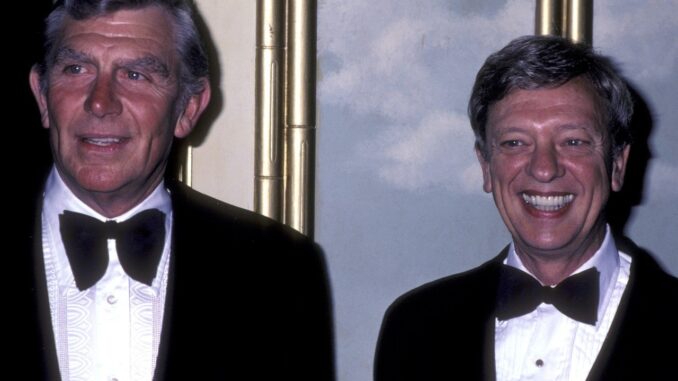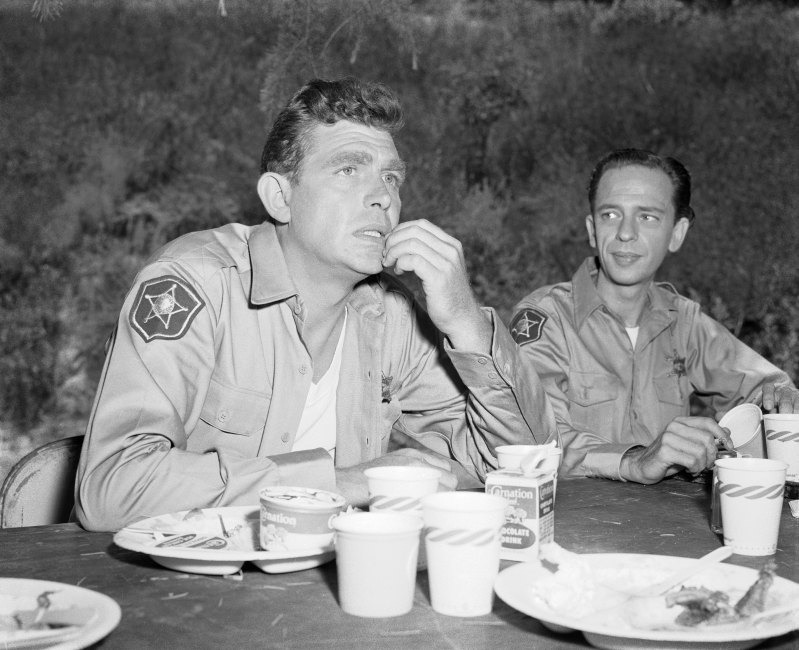
The Unlikely Origins of Mayberry
Mayberry didn’t begin as a town—it began as a test. A single episode of Make Room for Daddy introduced audiences to Sheriff Andy Taylor, a calm, kind, down-to-earth lawman raising his son in a quiet Southern town. That episode wasn’t just a guest appearance. It was a backdoor pilot for what would become The Andy Griffith Show.
Andy Griffith’s Humble Beginnings
Andy Griffith didn’t grow up in Hollywood. He was born in Mount Airy, North Carolina, a town many believe inspired Mayberry. His early life was modest, filled with music, ministry, and storytelling. He got his first big break with a monologue called “What It Was, Was Football,” which catapulted him into the national spotlight. But Andy wasn’t chasing fame—he loved the craft, not the cameras.
How Broadway Changed His Path
Griffith’s success on Broadway in No Time for Sergeants made him a rising star. Hollywood took notice, but Andy remained cautious. He didn’t want to be boxed into a persona or lose creative control of his work. The idea of anchoring a weekly sitcom? That didn’t exactly light him up inside.
From Stage to Screen: A Cautious Transition
Andy dipped his toes into TV and film with roles in A Face in the Crowd (1957) and television specials. But he found Hollywood exhausting. Fast-paced, image-obsessed, and creatively stifling at times. He was wary of becoming a “product,” a fear many stage actors share.
Why Andy Didn’t Trust TV at First
Andy Griffith was skeptical of television. In his eyes, it too often valued flash over substance. He’d seen actors burned out, turned into caricatures of themselves, or trapped in long contracts for shows that ran dry after a season or two. Griffith wanted no part of that.
The Danny Thomas Connection
The Andy Griffith Show wouldn’t exist without Danny Thomas. Thomas, already a TV powerhouse with his own hit sitcom, wanted to launch new shows. When Andy guest-starred on Make Room for Daddy, the audience responded so well that CBS saw dollar signs. But Andy? He still wasn’t convinced.

Why a Comedy Star Almost Avoided Sitcoms
Griffith didn’t consider himself a traditional comedian. He had comedic timing, sure, but his style was slow-burning, thoughtful, and character-driven. He feared the rapid-fire, joke-a-minute sitcom model would water down what he brought to the table.
The Original Vision for the Show
The producers envisioned The Andy Griffith Show as more slapstick. But Andy resisted. He insisted the humor come from character, not gags. Sheriff Andy Taylor wasn’t going to be a fool—he’d be the grounded heart of the show, letting the colorful side characters shine around him. That subtle shift changed everything.
Creative Control: A Make-or-Break Deal
Andy only agreed to do the show when producers granted him creative input. That meant choosing writers, overseeing the tone, and ensuring the show aligned with his values. This wasn’t just a contract—it was a pact: keep the show authentic or no deal.
The Rural TV Boom—And Andy’s Doubts
In the early 1960s, “rural” shows were taking over the airwaves—Green Acres, The Beverly Hillbillies, and Petticoat Junction to name a few. CBS wanted a piece of that pie, but Andy feared being lumped in as just another hillbilly sitcom. He didn’t want Mayberry to be a punchline.
Fear of Typecasting and the Trap of One Role
Andy had seen it happen: actors who became their characters. Forever. He worried that playing a small-town sheriff would define—and limit—him forever. And in some ways, it did. But in ways that were ultimately rewarding and career-defining.
What Changed His Mind? The Dealbreaker That Became a Dealmaker
What finally got Griffith on board? A combination of things: creative freedom, a chance to shape the show’s tone, a solid producing team, and a genuine love for the material. Most of all, he realized Mayberry could be something special—not just a comedy, but a reflection of values he believed in.
Filming the Pilot: ‘Make Room for Daddy’ and the First Taste of Mayberry
Andy’s first real taste of Mayberry came in his guest appearance on Make Room for Daddy. That single episode was so successful, CBS fast-tracked The Andy Griffith Show. But Andy still took his time, carefully overseeing casting—especially for Opie, played by Ron Howard—and shaping the early scripts.
Why Griffith Demanded the Show Stay ‘Real’
One of Andy’s biggest rules? “No one in Mayberry gets hurt.” He insisted the show reflect a sense of community, family, and dignity. No pratfalls. No meanness. He didn’t want easy laughs—he wanted honest moments. And that’s why people still love the show today.
Legacy of Saying Yes: What the Show Gave Andy Griffith
Had Andy walked away, television history would look very different. But his leap of faith paid off. The show ran for eight beloved seasons, spawned multiple spin-offs (Gomer Pyle, Mayberry R.F.D.), and made Griffith a household name. More than that, it created a cultural touchstone that still resonates over 60 years later.
What Mayberry Would’ve Been Without Him
Imagine a Mayberry without Andy Taylor. It’s hard to picture. He was the glue. The balance between Barney’s chaos and Aunt Bee’s tradition. Without Griffith’s calm presence and quiet authority, the show wouldn’t have had the same heart—or the same success.
Conclusion: One “Yes” That Changed Everything
Andy Griffith almost said no. And we almost never had Mayberry. But that one yes, born out of creative integrity and personal conviction, gave us a slice of Americana that still lives on. It wasn’t about chasing stardom—it was about making something that felt true. And Andy Griffith did just that.
FAQs
1. Why was Andy Griffith hesitant to do television?
Griffith was wary of losing creative control and feared being typecast. He also questioned the quality and longevity of TV sitcoms at the time.
2. Did Andy Griffith have full control over The Andy Griffith Show?
Not full control, but he had significant creative input, particularly regarding casting, tone, and story direction.
3. What made him finally agree to do the show?
He was swayed by a blend of creative freedom, trust in the producers, and the opportunity to shape a show that aligned with his values.
4. Was the show always intended to be heartfelt and character-driven?
Not initially. It was supposed to be more comedic and slapstick, but Griffith guided it toward a more thoughtful, human tone.
5. How did his decision affect his legacy?
It cemented him as a television icon. Though he feared being typecast, the show made him beloved across generations and redefined the family sitcom.
